
The Africa Cup of Nations referred to as AFCON, and sometimes as African Cup of Nations, is the main international men's association football competition in Africa. It is sanctioned by the Confederation of African Football (CAF), and was first held in 1957. Since 1968, it has been held every two years, switching to odd-numbered years in 2013.

The Confederation of African Football, or CAF for short, is the administrative and controlling body for association football, futsal and beach soccer in Africa. It was established on 8 February 1957 at the Grand Hotel in Khartoum, Sudan by the national football associations of Egypt, Ethiopia, South Africa and Sudan, following formal discussions between the aforementioned associations at the FIFA Congress held on 7 June 1956 at Avenida Hotel in Lisbon, Portugal.

The Senegalese Football Federation is the governing body of football in Senegal. It is based in the capital of Senegal, Dakar, and was founded in 1960. The FSF aided in the development of football in Senegal, specifically for its professional and amateur leagues, youth and women's football and academies. Currently the FSF oversees the professional leagues, run by the Ligue Sénégalaise de Football Professionnel (LSFP) and fully organises the national teams, youth, women's and amateur football and all football administration.

The 2013 Africa Cup of Nations, also known as the Orange Africa Cup of Nations South Africa 2013 for sponsorship reasons, held from 19 January to 10 February 2013, was the 29th Africa Cup of Nations, the football championship of Africa organized by the Confederation of African Football (CAF). Starting from this edition, the tournament was switched to being held in odd-numbered years instead of even-numbered years so that it does not clash with the FIFA World Cup. This edition was therefore the first to be held in an odd numbered year since 1965.

The Africa Beach Soccer Cup of Nations (BSAFCON) is the main championship for beach soccer in Africa, contested between senior men's national teams who are members of the Confederation of African Football (CAF). It is the sport's version of the better known Africa Cup of Nations in association football.

The 2015 Africa Cup of Nations, known as the Orange Africa Cup of Nations, Equatorial Guinea 2015 for sponsorship reasons, was the 30th staging of the Africa Cup of Nations, the international men's football championship of Africa. It was organized by the Confederation of African Football (CAF) and was held from 17 January to 8 February 2015.

The 2017 Africa Cup of Nations, known as the Total2017 Africa Cup of Nations for sponsorship reasons, was the 31st edition of the Africa Cup of Nations, the biennial international men's football championship of Africa organized by the Confederation of African Football (CAF). The tournament was scheduled to be hosted by Libya, until CAF rescinded its hosting rights in August 2014 due to the Second Libyan civil war. The tournament was instead hosted by Gabon. This event was also part of the Africa Cup of Nations 60th Anniversary.

The Morocco national beach soccer team represents Morocco in international beach soccer competitions and is controlled by the Royal Moroccan Football Federation, the governing body for football in Morocco.

The 2019 Africa Cup of Nations, known as the Total2019 Africa Cup of Nations for sponsorship reasons, was the 32nd edition of the Africa Cup of Nations, the biennial international men's football championship of Africa organized by the Confederation of African Football (CAF). The tournament was hosted by Egypt. The competition was held from 21 June to 19 July 2019, as per the decision of the CAF Executive Committee on 20 July 2017 to move the Africa Cup of Nations from January/February to June/July for the first time. It was also the first Africa Cup of Nations expanded from 16 to 24 teams.
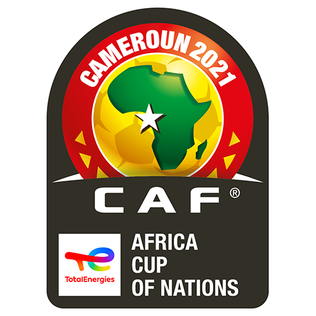
The 2021 Africa Cup of Nations, known as the TotalEnergies2021 Africa Cup of Nations for sponsorship reasons, was the 33rd edition of the Africa Cup of Nations, the biennial international men's football championship of Africa organised by the Confederation of African Football (CAF). The tournament was hosted by Cameroon, and took place from 9 January to 6 February 2022.

The 2015 Africa U-23 Cup of Nations was the 2nd edition of the Africa U-23 Cup of Nations, the quadrennial international age-restricted football championship organised by the Confederation of African Football (CAF) for the men's under-23 national teams of Africa. The tournament started on 28 November and finished on 12 December 2015. A total of eight teams are playing in the tournament.

The 2015 CAF Beach Soccer Championship, also known as the 2015 Africa Beach Soccer Cup of Nations, was a beach soccer tournament which took place in Roche Caiman, Seychelles on 14–19 April 2015. This was the first time that the CAF Beach Soccer Championship was held in Seychelles. All matches were played at the Roche Caiman Sports Complex.
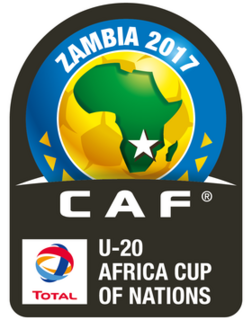
The 2017 Africa U-20 Cup of Nations, officially known as the Total U-20 Africa Cup Of Nations, Zambia 2017, was the 14th edition of the Africa U-20 Cup of Nations, the biennial international youth football tournament organized by the Confederation of African Football (CAF) for players aged 20 and below. The tournament was set to take place in Zambia between 26 February – 12 March 2017.

The 2017 Africa U-17 Cup of Nations, officially known as the Total U-17 Africa Cup Of Nations, Gabon 2017, was the 12th edition of the Africa U-17 Cup of Nations, the biennial international youth football tournament organized by the Confederation of African Football (CAF) for players aged 17 and below.
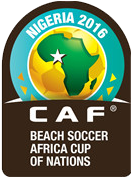
The 2016 Africa Beach Soccer Cup of Nations, also known as the 2016 CAF Beach Soccer Championship, was a beach soccer tournament which took place in Lagos, Nigeria in December, to determine the best beach soccer nation in Africa and doubles as a qualification event for the 2017 FIFA Beach Soccer World Cup, with the two finalists progressing to the finals in the Bahamas. This was the first time that the tournament is held in Nigeria.

The 2019 Africa U-23 Cup of Nations was the third edition of the Africa U-23 Cup of Nations, the quadrennial international age-restricted football championship organised by the Confederation of African Football (CAF) for the men's under-23 national teams of Africa. It was hosted by Egypt between 8 and 22 November 2019.

The 2018 Africa Beach Soccer Cup of Nations was the third edition of the Africa Beach Soccer Cup of Nations (BSAFCON), the premier beach soccer championship in Africa contested by men's national teams who are members of the Confederation of African Football (CAF). Originally organised by Beach Soccer Worldwide (BSWW) under the title FIFA Beach Soccer World Cup CAF qualifier, in 2015, CAF became organisers and began using the BSAFCON title to which the competition was officially renamed the next year. Overall, this was the 9th edition of the event.
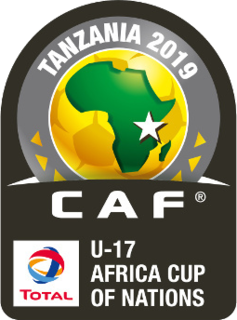
The 2019 Africa U-17 Cup of Nations was the 13th edition of the Africa U-17 Cup of Nations, the biennial international youth football tournament organized by the Confederation of African Football (CAF) for players aged 17 and below. In May 2015, it was decided that the tournament would be hosted by Tanzania.
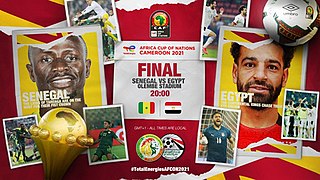
The 2021 Africa Cup of Nations Final was a football match that determined the winner of the 2021 Africa Cup of Nations, the international men's football championship of Africa, organized by the Confederation of African Football (CAF) which was played between Senegal and Egypt. The match was held at the Olembe Stadium in Yaoundé, Cameroon, on 6 February 2022. Senegal qualified for the knockout stages by finishing at the top of their group with five points. They reached the final by beating Equatorial Guinea and Burkina Faso in the quarter-final and semi-final respectively. Egypt finished second in Group D behind Nigeria. They defeated Morocco in the quarter-finals, and then knocked out hosts Cameroon on penalties.
The 2022 Africa Beach Soccer Cup of Nations was the fifth edition of the Africa Beach Soccer Cup of Nations (BSAFCON), the premier beach soccer championship in Africa contested by men's national teams who are members of the Confederation of African Football (CAF). The championship was originally organised by Beach Soccer Worldwide (BSWW) under the title of FIFA Beach Soccer World Cup CAF qualifier. In 2015, CAF became its organisers and began using the BSAFCON title to which the competition was officially renamed the next year. Therefore, this was the 11th edition of the event overall.




















